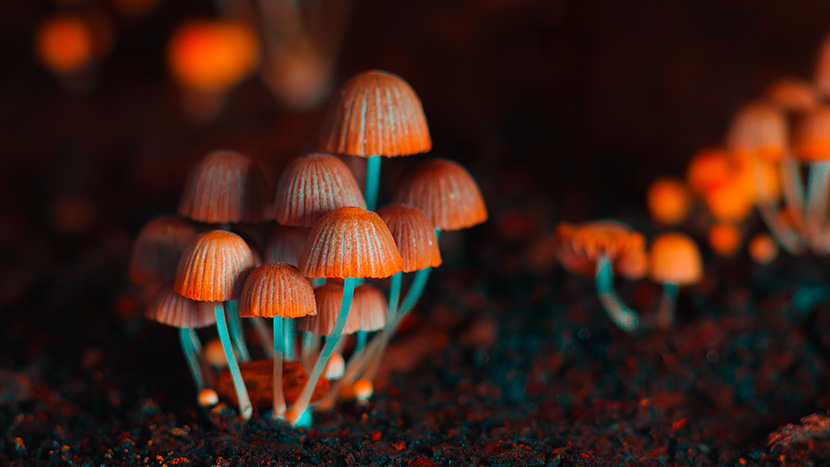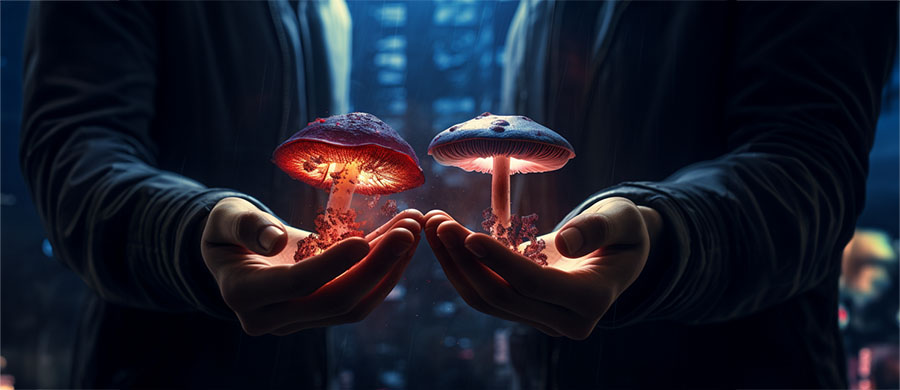Microdosing Psilocybin: The Science and a First Hand Account
You may have heard that we are in a mental health crisis worldwide. In fact, one in five people in the US lives with a mental health illness. Whether you are experiencing it first-hand or through our loved ones, it is clear that many others are also struggling with their mental health. In saying this, a solution isn’t always so simple. Though pharmaceutical drugs and conventional therapy do help a lot of those suffering with illness such as depression and anxiety, it is not always the case. In fact, conventional antidepressants and other medications can often cause more issues with patients, everything from weight gain, to exhaustion, reduced libido, and even worsening depression. With all of this in mind, people are looking for better alternatives to help, and one of the big new frontiers is the mushroom revolution.

Functional Mushrooms
Functional mushrooms, like Chaga and Lion’s Mane as just two examples, are showing a lot of promise in helping people with all kinds of ailments, from more regulated immune systems, increased energy, and even better memory and learning, the mushroom revolution is helping people to re-learn how amazing mushrooms can be for our health.
Included in this revolution are of course the fungi that contain psychoactive components and are showing great promise for mental health, such as Amanita muscaria, and Psilocybin mushrooms.
Psilocybin Mushrooms and Mental Health
Psilocybin Mushrooms contain the psychedelic compounds psilocybin and psilocin, and that is what can cause the psychoactive effects But it does so much more than that. We have a more detailed article on psilocybin mushrooms here, but the idea is that this fungi is what we can call a serotonergic hallucinogen – this means that it can actually increase the number of connections going on in the brain at once. This increase of connections can have a wide range of positive impacts on users, from increasing plasticity for learning, to helping people see their struggles from new, often more productive, angles.
Taking Psilocybin Mushrooms
There are essentially two ways to approach magic mushrooms therapy, and these are by macrodosing or microdosing.
There is some debate around macrodosing and micro-dosing psilocybin. Particularly do they both show positive results. Current research is starting to figure this out. Right now there seems to be benefits from both. We also understand that for some people, taking the time for a proper hero’s journey or to go on a psilocybin mushroom retreat is not an option. So, with that in mind, we explored microdosing magic mushrooms. This is what we have found.
Microdosing Psilocybin Mushrooms
If you have any interest in the world of fungi it is very likely that you have heard the word “microdosing” in terms of magic mushrooms. This just means that people take a small amount of these psychedelic mushrooms over a longer period of time, intermittently, as opposed to taking multiple grams at once and experiencing a psychedelic trip. So instead of taking around 1-4 grams, you would take 5-10% of that amount over maybe 21 days. Then you take a break, and at some point you can rotate it again.
Other psychoactive fungi also seem to show promise in microdosing therapy. For example, surveys done about microdosing Amanita muscaria have shown very positive results.
Microdosing Psilocybin Research
Psilocybin therapy using the microdosing technique has shown a lot of promise. For example,
James Fadiman (AKA the father of microdosing) has been leading a lot of microdosing research with very exciting results. His surveys have revealed that people who have tried microdosing psilocybin have seen a huge range of benefits, such as:
- Reduction in anxiety (general, social, academic)
- Control of Asbergers symptoms
- Reduced depression
- Reduced headaches / Lessened migraines
- More personal insights (therapeutic and work related, increased organization of ideas)
- Better learning – languages and advanced math more easily
- More focus/attention
- Improved grades
- Reduced PMS and menstrual symptoms
- Deceased triggering of trauma
- Less procrastination
- More libido/better sex (which might be confounded with closeness between partners, better communications, and more energy – but either way is great!)
- Improved workflow and quality of work
- Ability to drop other medications
- Reduced pain – which likely has to do with anti-inflammatory properties found in many fungi
One study showed little difference after microdosing on mental health outcomes, but we are skeptical as they seem to mostly work with “already healthy” individuals, so any effect would likely be miniscule. However, we do think that research needs to keep happening to really understand what is going on when people microdose mushrooms.
How Does Microdosing Work?
Research has still not caught up to tell us exactly how people are experiencing these improvements, but it most likely has to do with increasing neuroplasticity, which in short just means it helps your brain be more flexible and open to learn, find new solutions to things, see things and a new angle, and more. There are also theories that it could impact the Mitochondria, which is the powerhouse of our cells. Last, there is a chance this is all just a placebo effect, but more research comes out all the time to suggest otherwise.
Interestingly, some other great benefits that could be considered secondary to microdosing are: more motivation to exercise, better overall mood, more productive work, and less drug use (including alcohol and caffeine). All of these things likely work in a kind of a positive feedback loop with one another. For example, if you feel better, you exercise more, and drink less, then you feel even better, and can keep doing the things that help you feel good. The psilocybin may just be a catalyst to help get these habits moving.
The First-Hand Account of Magic Mushroom Microdosing
In summary, the main things Rob noted in his experience with microdosing mushrooms were:
- Being more patient
- Reduced negative chatter
- Finding joy in simple tasks
- Just feeling overall like he was having a great day
However, in the end Rob also said that he could feel a bit off if he took too much and even a slight decrease in cognitive ability at times. Ultimately, Rob felt that he didn’t need it, but can see how it could help others.

Important Final Notes
As microdosing magic mushrooms gains popularity, we should be excited and cautious about the information that surfaces, because even though it shows great promise, it needs to be done properly. With this being said, It is good practice to have a coach/therapist work with you as you experiment a bit with what your right psilocybin dose is, how often you should take it, and how long you should take a break for. Also, people need to remember that the effects take time. This is not something that will help you feel better in 48 hours. Last, more research needs to be done to really understand all of the effects of psilocybin on the brain. All in all, we do see great promise in this as a way to help us tackle this mental health crisis and make a real difference.

